Editor’s Note: Dr. W. A. Criswell first preached this sermon on March 11, 1956.
This morning we are speaking of The Spirit World. When we open our Bible, we walk immediately
into a supernatural world, one of far greater extent and vastness than we would ever suppose or
guess by living in this terrestrial and mundane earth. There is but a step between us in the natural
world and those who live in the spiritual world. And the veil that separates is our flesh.
The spirit world is one of vast and intense activity. God, the triune God, the devil and his angels,
Michael and his angels, and the orders that God has created in that celestial world, as well as the
orders that God created but fallen, now work in a dark and evil and iniquitous world. For example, to
start o with – now, I don’t know whether you can turn to these passages. If you can, ne. If you
cannot, you do not need to. In the first chapter of Paul’s letter to Colossia, Colossae, to the
Colossians, he names a good order of angels.
Colossians 1:16: thronoi, kuriotetes, archai, exousiai.
He says there, in the sixteenth verse of that first chapter of Colossians, that Christ is above all of these created orders of angels, and that by Him did they come into being. You have it translated here “thrones, dominions, principalities, powers.” They are orders of angelic beings in that upper and more glorious world.
Now, you have the same thing only in a netherworld in the last chapter of the Book of Ephesians. He
names there a series of angelic orders who are evil. Ephesians 6:12: “For we wrestle not against flesh
and blood.” If you could put your hands on your enemy, you might put a knife in him, cut his throat,
shoot him dead. But you don’t fight – your warfare is not against –flesh and blood, but against
archai, exousiai, kosmokratorai, pneumatika.
Now, you have it translated, “Your warfare is against archai.” You can translate that in most any way
you want to. “Principalities” is good or bad. “Against powers, exousiai” – it’s another order of beings.
Kosmo means “the world” – kratoras, world rulers of this darkness. You have it translated: “against the
rulers of the darkness of this world.” No – world rulers, kosmokraterai, world rulers of this darkness.
Now, you have it translated: “spiritual wickedness in high places.” No – spiritual hosts of wickedness,
spiritual hosts, angelic hosts of darkness. Now, you have it translated: “in high places,” epouranion, in
the heavenlies, in the spirit world.
Now, this morning we’re going to take the whole Bible and look at that spirit world. The Bible has a
good deal of the pulling aside of the veil and looking beyond and into that other world presided over
by God and by Satan. Now, in this angelic order of beings I place first – and I say I do it; I do not know
how else to do it. It may not be that way at all, but I place first the seraphim. The seraphim were
seen by Isaiah in the sixth chapter of his prophecy, when he saw the Lord high and lifted up. He also
saw the seraphim. That’s the Hebrew word meaning the burning ones, the flaming ones, the brilliant
ones, the iridescent ones, the incandescent ones. He saw the seraphim. They were covered with six
wings: two over the face, two over the feet, and with two they did y. And they cried to one another,
“Holy, holy, holy, is the Lord God of hosts; the whole earth is filled with His glory.” [Isaiah 6:3] They
have to do with a calling of our attention to the holiness, the greatness, the glory of God – the
seraphim.
All right, now the second order – I say this is my order. I do not know how else to say it, but the
second order, the cherubim. In the Book of the Genesis, the beginnings, when the Lord drove out the
man and his wife, He placed on the east side of Eden the cherubim. And by the way, -im, whenever
you see an -im in your Bible – and it’s just full of them – that’s the Hebrew plural, i-m, -im. You have a
seraph and seraphim. You have a cherub and cherubim. It’s just the plural.
Now, the second order, the cherubim – on the east side of Eden the Lord God placed the cherubim.
Now, these angels – and you’re going to see in a little while how much that is true – these angels
have to do with certain great redemptive and prophetic features of the working of God with
humanity, with the human race.
Now, the cherubim are always identified with redemption. When He placed them there on the east
of Eden, that was a sign of God’s promise that if the man would come back in repentance and faith,
He’d have mercy upon him and forgive him. For it was the cherubim that were placed in image on
either side of the mercy seat, and they look full down upon the mercy seat in the holy of holies, and
their wings were outstretched upon it.
Now, in the vision of Ezekiel and in the fourth chapter of the Revelation, I think those living ones – in
the Revelation they’re translated as beasts – oh, that was a terrible way to translate it, to zoon, to
zoon. Zoology comes from it. Zoon, the living ones, the living beings – they were the cherubim.
They were the signs in the ministries of the great, atoning, merciful overtures of God. So you have a
second order there, the cherubim.
Now, the third order are the angels. There is an innumerable number of angels. In the twelfth
chapter in the Book of Hebrews he says that we are come “to the city of the living God, to the
heavenly Jerusalem, and to an innumerable company of angels.” In the fifth chapter of the
Revelation he sees and he hears “the voice of the angels round about the throne, and of the living
ones” – the cherubim – “and the elders. And the number of them” – now listen to him – “and the
number of them was muriades muriadon chiliades chiliadon.”
Now, that’s a good translation here: “And the number of them was ten thousands times ten thousand,
and thousands of thousands.” And that’s just exactly what that is. Muriades, myriads – muriadon –
that’s genitive, – don – of myriads. Chiliades, ten thousands, chiliadon, of thousands and ten
thousands. In other words, he just saw those angels singing around the throne of God, and they were
vast and innumerable – myriads upon myriads, upon thousands times tens of thousands.
Now, in your Bible you often have the Lord called “the Lord of hosts,” the God of hosts, the Lord God
of hosts. Now, those hosts do not refer to any earthly army or great company, but it refers to the
heavenly angels. The Lord God is the Lord God of hosts. He’s the Lord God of all of the great angelic
ranks and series and orders in heaven – the Lord God of hosts.
Now, according to Psalm 148 they all were created by the command of God. That is, they were
created by at. God spake, and they came into being. They’re all created orders. And they were
present with God – according to the thirty-eighth chapter of the Book of Job – they were present
with God at the creation of the world. And when they saw what God was doing, the thirty-eighth
chapter of Job says that they shouted for joy. It was a cause of amazement and wonder when the
host of heaven, when the angels of God, saw God create matter. It was a new thing. It was a
wonderful thing. And when God created us, it was a thing of marvel and glory to the angelic hosts in
heaven.
Now, one of two things about the angels – one is they are mighty, mighty in power. For one thing,
they are the ministers of the execution of the wrath and the judgment of God. In the thirteenth
chapter of Matthew, for example, in the parable of the tares the reapers are the angels. And in the
rst chapter of that second Thessalonian letter: “Rest assured, don’t be troubled, – said Paul to us –
for the Lord Jesus Christ is coming from heaven with his mighty angels to execute vengeance upon
those who do not believe the gospel of the Son of God.” [2 Thessalonians 1:7, 8]
To give you an example of the tremendous power of those angels who execute the judgment of
God, do you remember the story in Genesis? It was two angels who went down to Sodom and
Gomorrah and destroyed the city by the commandment of the Lord. Do you remember that? Do
you remember in the last chapter, the twenty-fourth chapter, of the second Book of Samuel, that
when David sinned by numbering the people, there was an angel who destroyed Israel with a
pestilence?
And David saw that angel standing over Jerusalem with his sword drawn to destroy Jerusalem. And
when he did, he cried to God, saying, “O God, let it fall upon me and my house, for these poor lambs,
what have they done?” [from 2 Samuel 24:17]
The destroying angel – do you remember in the second Book of Kings that it was one angel – just
one – that passed over the Assyrian army of Sennacherib one night, and slew 185,000 of
Sennacherib’s soldiers? Just one angel – they are mighty, I say, in power.
Now, may I speak of the angels in their ministries in the New Testament? It is an angel that comes
and speaks to Zacharias, announcing the birth of John the Baptist, who is to prepare the way of the
Lord. It is that same angel that is sent from God to tell Mary, the Jewish maiden, that she is to be the
mother of that long-prophesied child. It was an angel who came down and told the shepherds at
Bethlehem that the child was born in Bethlehem.
And when he made the announcement, suddenly the veil was lifted and ascending and descending
– that heavenly host, praising God in song. Three times an angel speaks to Joseph, saying, “Do this,
and do that.” When the Lord God was tempted in the wilderness, and Jesus was sore tried, an angel
came and ministered unto Him. In Gethsemane, when His agony was as sweat of blood, an angel
came and strengthened Him.
When He was laid in the tomb, and a stone rolled over the sepulcher, and sealed with a Roman seal,
it was an angel who came and rolled it away and broke the seal. It was an angel who led the
apostles out of prison, and told them to go stand and preach. It was an angel who told Philip to
leave Samaria and go down into Gaza – they pronounce that today the Gaza Strip – go down into
Gaza and preach to the Ethiopian eunuch.
It was an angel who let Peter out of prison, broke the chains, and broke the fetters, and opened the
great iron door, and they passed through. It was an angel who smote Herod, who blasphemed. So
he died – Herod the king. And it was an angel who appeared time and again to Paul, comforting and
strengthening him in the great work that he was doing. The ministry of angels in the New Testament
is sweet and precious and encouraging with awe.
Now, may I name three of those glorious angels? The rst one we’ve already discussed – the most
powerful and glorious of them all – the first angel is Satan. He’s called in Ezekiel “the cherub that
covereth.” That is, he had charge of the protection and the guarding and the keeping of the throne of
God. And I spake upon him the last time – he’s the first of them all.
Now, the second angel that is mentioned by name in the Bible is called also an archangel. His name
is Michael, and he’s mentioned five times by name in the Bible. And if I could say the only archangel
that’s named in the Bible is Michael, when Paul writes that at the voice of the archangel we are to be
raised from our sleep in the dust of the ground – these bodies, we’re to be raised – why, then if that
archangel is Michael, then he’s named six times in the Bible.
Now, one time that Michael is named is in Jude, and what an unusual way to present him. In the
ninth [verse] of Jude it says – now, Jude is talking about Satan, he’s not talking about Michael or
anything else. He’s talking about Satan. Now, look at what he says about Michael. The ninth verse:
“Yet Michael the archangel, when contending with the devil – with Satan – he disputed about the
body of Moses – now, bear in mind how powerful an angel is, much less an archangel – when
Michael the archangel, contending with the devil he disputed about the body of Moses, durst not
bring against Satan a railing accusation.” [Jude 9]
Didn’t dare to do it – but Michael the archangel said, “The Lord rebuke thee.” He didn’t dare, he didn’t
dare cross Satan. He didn’t dare speak a railing accusation against him. He didn’t dare condemn
him. Think of that. Michael the archangel didn’t dare. Some of these days I’m going to preach a
sermon on why they were disputed about the body of Moses, but I got to quit in a minute – can’t do
everything. You’ve got to come back. Michael the archangel – that’s one time he’s mentioned.
All right, another time is here in the twelfth chapter of the Book of the Revelation:
And there was war in heaven: Michael and his angels fought against the dragon; and
the dragon fought and his angels.
And they overcame him by the blood of the Lamb, and by the word of their testimony.
[Revelation 12:7, 11]
That shows to me that this war is yet to come. It’s after the blood of Christ – Michael and his angels
warring against the devil and his angels.
Now, the other three times that Michael is mentioned in the Bible by name is here in the Book of
Daniel: “Michael, one of the chief princes” – Daniel 10:13. In the last of that one: “Michael, your prince.”
And then the third time is in the twelfth chapter: “And at that time shall Michael stand up, the great
prince which standeth for the children of thy people.” [Daniel 12:1] Somehow, Michael has to do with
the elective purposes of God regarding Israel.
And now, the other angel that is named – I say there are three of them: Satan is named; Michael is
named – and the other angel that is named is Gabriel. And he is named four times in the Bible. And
Gabriel has to do with redemption. Gabriel has to do with the coming of Christ.
Look at this: One time that he’s mentioned is in Daniel 8:16: “Gabriel, make this man to understand
the vision.”
Then the other time in Daniel, the second time he’s named, is in the ninth chapter of the Book of
Daniel: “And while I was speaking in prayer, even the man Gabriel.” He looked like a man. I don’t
know what an angel would look like if you were to see him, except that he looks like a man, a
glorious man. That’s what they looked like at the tomb when the women saw them.
Then Gabriel, here in the ninth chapter of the Book of [Daniel], tells Daniel when it is that Christ is
coming, when the Messiah is to be sent for the redemption of the world. That’s what Gabriel did: He
told Daniel when it was that Jesus was to come.
All right, look at it. In the fullness of time, when the day came for the Lord to be born, who was it sent
to say: “And the time is now. The fullness of time is come”? Why, it is that same angel, Gabriel.
Gabriel is sent and, standing there by the golden altar of incense, on the right side, he speaks to
Zacharias and announces to Zacharias that the time is come – foretold so many hundreds of years
before – the time is come, and John is to be born, and he’s to prepare the way for the Lord.
Then that same angel, Gabriel, is sent to Nazareth, and appears there to a maiden girl named Mary,
and announces to her that the Holy Spirit shall come upon her, and the shadow of the Most High
shall come upon her, and that holy thing that shall be born of her shall be called the Son of God, the
Savior of the world.
Gabriel must be a glorious angel, for when he stood in the presence of Zacharias, he introduced
himself like this: “I am Gabriel, who stand in the presence of God.” [Luke 1:19] Think of that, standing
in the presence of God. And the Bible says if we were to see God, we’d die. “I am Gabriel, who stand
in the presence of God.”
Now, beloved people, if I had thirty minutes more, I’d preach on this last thing, but I’ll just read the
text and that’s all. In Hebrews 1:[14] he says of angels, “Are they not all ministering spirits, sent forth to
minister for them who shall be heirs of salvation?” What do the angels do? They help us who have
placed our trust in the Lord Jesus. By our side angels work and encourage and minister and help.
Were it not for them, Satan would defeat us – the devil and his angels, not even archangels, not even
Michael, dare confront him.
We do by the power of Jesus, by the blood of the Lamb, by the word of our testimony, and by the
angels, who are sent forth to minister with us, helping us, who are the heirs of salvation. There’s an
angel with you – the ministering spirits of God, guiding and guarding and keeping. Oh, there’s so
much you could say!
If there are angels in glory – one is named Michael, one is named Gabriel – why, we’re going to be
that way in glory. We’ll be named. You’ll be so-and-so, and you’ll be thus-and-so. And you’ll be you,
and I’ll be I. We’ll be people up there, somebody up there, just like the angels are somebody up
there.
I’ll see Gabriel some of these days and talk to him. I’ll see Michael some of these days and talk to
him. They’re people, they’re somebody, they’re created beings – the seraphim and the cherubim and
you, gloried, living in the presence of God forever. Oh, what vistas of glory and wonder hath the
Lord for those who place their trust in Him, that other, the spirit world.
Now, let’s sing our song – just a stanza. And while we sing it, somebody put his
trust in Jesus. Somebody put his life in the church, however God shall press the appeal to your
heart. Somebody you, on the first stanza, into the aisle and down here to the front as God would bid
you come. So may we stand, and so may we sing.

Sermon: The Spirit World
1 Comment
Leave a Reply
Latest from Religion

The Weimar Years – Part 1
This started out as an attempt to better understand Weimar Germany by chronicling my reactions to the audiobook version of “The Weimar Years: Rise and Fall 1918-1933” by Frank McDonough. Writing my
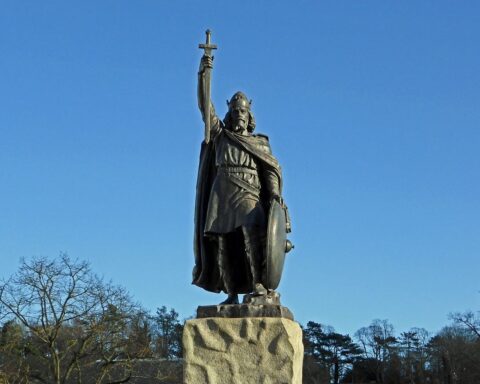
Alfredus Rex Fundator
"Alfred was a Christian hero, and in his Christianity he found the force which bore him, through calamity apparently hopeless, to victory and happiness."
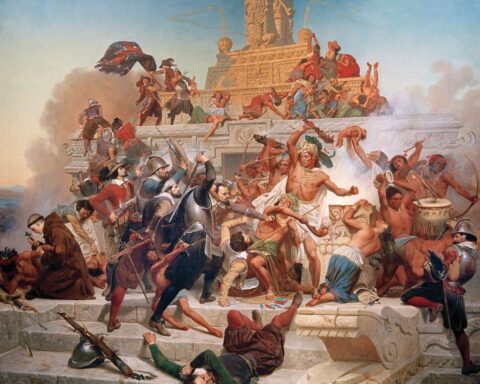
The Story of Cortez
It seemed to me that, having to speak tonight to soldiers, that I ought to speak about soldiers. Some story, I thought, about your own profession would please you most and teach
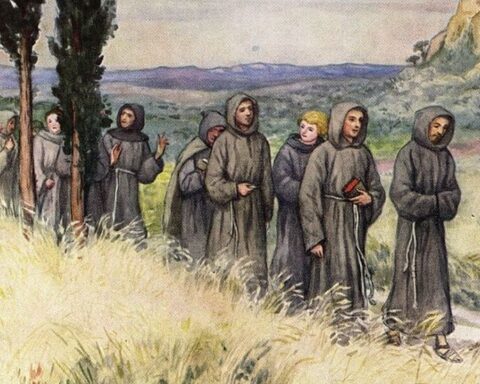
The Coming of the Friars
When King Richard of England, whom men call the Lion-hearted, was wasting his time at Messina, after his boisterous fashion, in the winter of 1190, he heard of the fame of Abbot
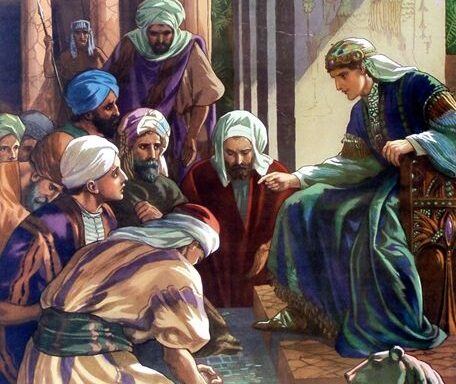
“Joseph” by Charles Kingsley
Editor’s note: The following is extracted from The Works of Charles Kingsley, Vol. 25 (published 1885). (Preached on the Sunday before the Wedding of the Prince of Wales. March 8th, third Sunday


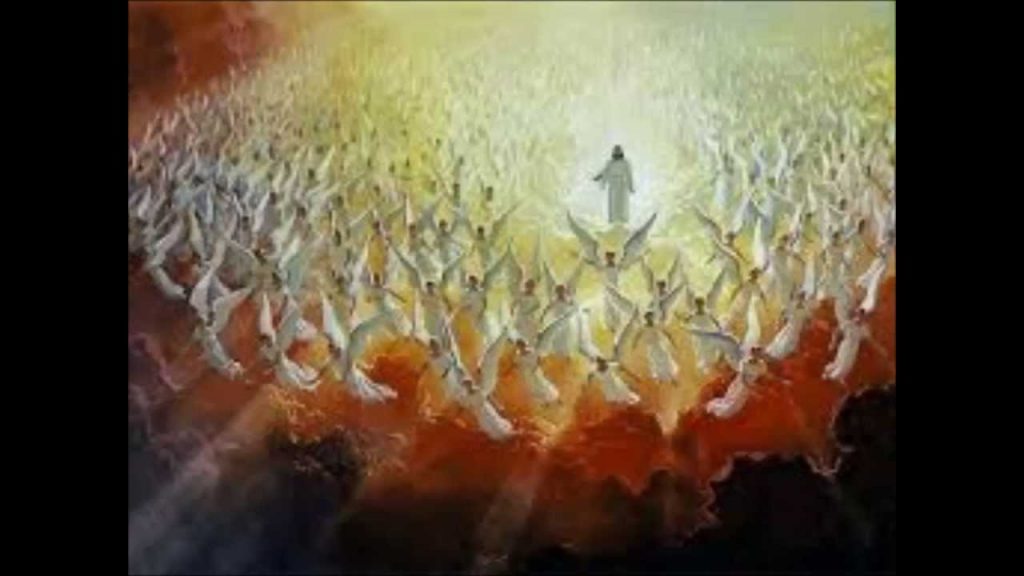
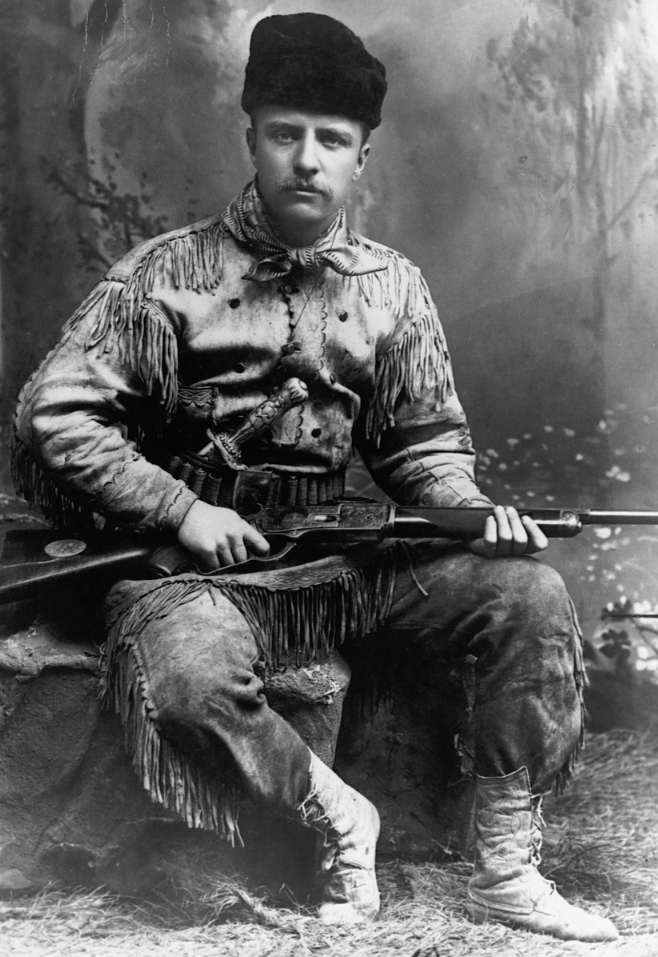
5